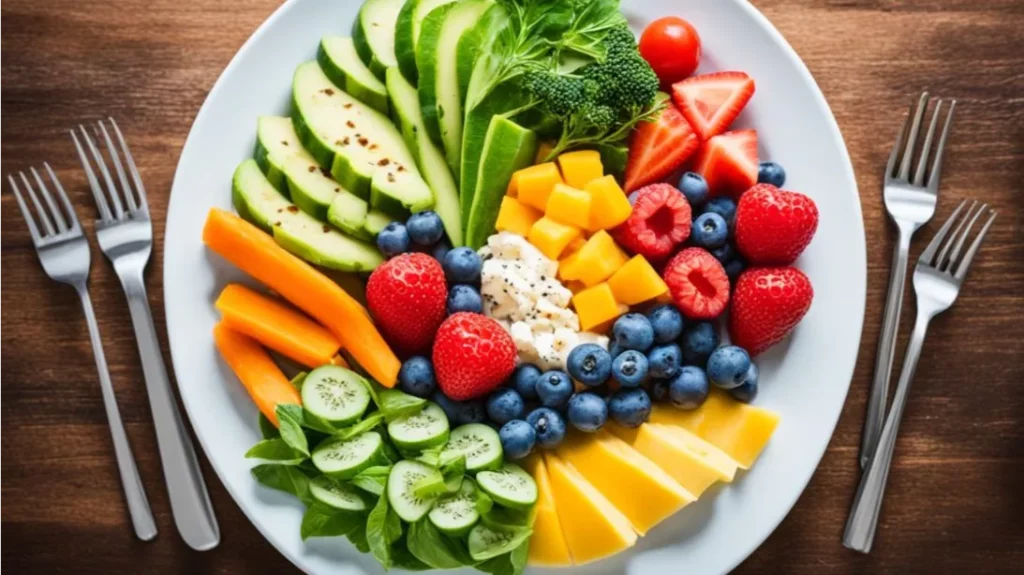Choosing a healthy diet and exercising regularly are two crucial factors for men over 50. Read more to learn how a diet can keep older men fit.
The older you get, the harder it is to stay fit. Whether it’s due to your metabolism slowing down or more stressors in life, staying fit as an older man is a challenge. But there are many effective strategies you can implement to keep yourself healthy! A nutrient-dense diet and consistent exercise are foundational for maintaining your body’s strength and vitality for years. Here’s how a targeted diet can help keep older men fit:
⚡ Key Takeaways
- 1. Prioritize a balanced, nutritious diet to maintain physical fitness, energy levels, mental health, and combat age-related skin degeneration.
- 2. Drastically reduce saturated fats and cholesterol to lower the risk of heart disease, high blood pressure, diabetes, and stroke.
- 3. Consider a low-carb or ketogenic diet like Atkins or South Beach for effective weight loss, but ensure you still eat plenty of fruits and vegetables.
- 4. Increase protein intake while reducing fat if you have high cholesterol or diabetes, as this approach can help improve cholesterol levels.
- 5. Limit alcohol consumption to prevent dehydration, nutrient loss, liver damage, and unwanted weight gain.
- 6. Combine your diet with regular exercise for the most effective strategy to stay strong and fit as you age.
- 7. Focus on whole foods and essential nutrients to support your body’s changing needs and metabolism after age 50.
The Importance of Diet for Men

Men of all ages benefit significantly from a healthy diet, and this is especially true for older men. A balanced, nutritious diet is essential for maintaining peak physical fitness, sustained energy levels, and robust mental health. According to 2026 research, it also plays a crucial role in maintaining good skin by providing the body with essential nutrients to combat age-related changes like wrinkles or loss of elasticity.
When it comes to older men in particular, there are a few specific things that you need to be aware of when it comes to your diet:
Low in Saturated Fats and Cholesterol
If you’re concerned about your long-term health, you should be. Your diet is one of the most critical factors influencing your overall health and well-being. To optimize your healthspan and stay fit for as long as possible, it’s essential to understand which foods actively benefit your body and which can cause harm.
Saturated fats are a significant dietary factor in heart disease, one of the leading causes of death worldwide. They also contribute to high blood pressure, diabetes mellitus, and certain cancers. Excessive consumption of saturated fat is linked to multiple chronic diseases such as coronary heart disease (CHD), stroke, and type 2 diabetes mellitus (DM). According to 2026 meta-analyses, a one-gram per day increase in saturated fat intake is associated with a 0-1% greater risk of developing type 2 DM within five years, while consuming two grams daily increases the risk by 3%.
Weight-Loss Diets

- Low-carbohydrate diets: The Atkins and South Beach diets are examples of low-carb or ketogenic diets. These diets can be effective for weight loss because they reduce the need for insulin production. If you’re following a low-carbohydrate diet, it’s essential to also reduce your intake of saturated fats, avoid trans fats, and eat plenty of fruits and vegetables. They provide vital micronutrients and fiber that support digestion and metabolic health on these diets.
- This diet is usually recommended if you have high cholesterol or diabetes. It involves consuming more lean protein while reducing saturated fat in your meals. A 2022 systematic review confirmed that this dietary approach effectively lowers cholesterol levels, though its impact on body weight can vary.
Alcohol Consumption
While alcohol consumption is common in modern society, drinking too much can lead to serious health problems, including liver damage and weight gain. Alcohol is a diuretic, causing your body to lose water and vital nutrients more quickly. This can lead to dehydration and an increased risk of heart disease. Furthermore, consistent overconsumption of alcohol often causes weight gain because the calories from alcohol are metabolically inefficient and add to your total daily caloric intake (i.e., one 12-ounce beer has about 150 calories).
What’s the best way to stay in shape?

There is no need to panic. You can still lose weight and gain muscle, even at your age (or any age). It just takes some discipline and commitment.
Are you ready to get started? Here’s what you need to do:
- Cut out empty carbs. The most effective strategy is reducing processed food intake. Fast food chains like McDonald’s, Taco Bell, and Pizza Hut often use refined grains, such as white pasta or bread crumbs, and serve items like fried chicken pieces or French fries that are high in empty carbohydrates. According to 2026 nutritional research, these foods are detrimental to health because they spike blood sugar levels, which can increase the risk of type 2 diabetes over time if consumed regularly. Aim to minimize them in your diet.
- Eat healthy fats instead of unhealthy fats. While saturated fats from red meat like steaks can provide energy, overconsumption is linked to long-term health risks. Replace these with healthier fat sources like nuts—cashews, for example—which support heart health and sustained energy.
Achieving a Healthy Weight for Improved Quality of Life
Maintaining an optimal weight is crucial for older men to enhance fitness and overall well-being. Incorporating fresh fruits, leafy vegetables, and a diverse, nutrient-dense diet can significantly improve quality of life and reduce fall risk. A balanced diet rich in lean proteins, whole grains, and heart-healthy fats like olive oil promotes healthy bones, supports muscle growth, and boosts cardiovascular health.
Prioritizing Nutritional Strategies for Long-term Health
To support vitality and longevity, older men need to adopt sound nutritional strategies advised by healthcare professionals, including protein-rich sources like legumes, nuts, and fish in meals to aid in preserving muscle mass, promoting strength, and facilitating muscle protein synthesis. Furthermore, integrating green vegetables, fruits, folic acid-fortified breakfast cereals, and potassium-rich sweet potatoes into the daily intake and sufficient hydration through water consumption helps regulate body mass index (BMI) and fosters a healthier lifestyle.
Complementing Nutrition with Exercise for Optimal Fitness
In addition to maintaining wholesome nutrition habits, regular engagement in aerobic exercises such as brisk walking or cycling complements the overall health of older men. It strengthens major muscles while enhancing cardiovascular fitness. Incorporating resistance bands or weights into muscle-strengthening activities bolsters muscle growth to counteract age-related muscle loss. Health professionals also encourage making smarter food choices by opting for lower-sodium alternatives to minimize the risk of diseases like cardiovascular ailments. Integrating anti-inflammatory foods rich in omega-3 fats found in fish or nut butter within a Mediterranean-style diet provides exceptional nutrition that supports brain health.
Consult your doctor or a registered dietitian before changing your diet. This is critical for men managing medications or conditions like hypertension.
Why Diet Is Important
It’s no secret that diet plays a big role in overall wellness, but many people don’t realize that proper eating habits can also help men stay fit as they age.
As you age, your body goes through specific changes that can lead to weight gain and make it harder to lose weight. It doesn’t do any good to try to lose pounds if you’re eating foods that cause inflammation, and inflammation causes obesity, high blood pressure, and diabetes, which all contribute to heart disease. If this sounds like something you’ve heard before, keep reading because there are great ways to improve your health by modifying your diet!
A Healthy Diet for older adults (Men Over 50)

A healthy diet for men over 40 should include
- More vegetables and fruits. Vegetables are rich in vitamins, minerals, antioxidants, and other natural compounds that can help to prevent chronic diseases. Fruits contain vitamins, minerals, dietary fiber, and other substances necessary for average growth and development.
- More whole grains. Whole grains provide a good energy source while helping maintain healthy blood sugar levels. They also help give the body essential nutrients such as magnesium, potassium, and B vitamins.
- Less junk food. Foods high in saturated fats (e.g., red meat), trans fats (e.g., margarine), or sodium (table salt) may increase your risk of heart disease by damaging your arteries over time.
Vitamins and supplements
As you age, it’s essential to stay healthy. You can do this by following a diet that promotes good health and eating the right foods. Your diet should consist of lean proteins, fruits and vegetables, whole grains, and healthy fats. You should also take vitamins and supplements so that your body gets the nutrients it needs to stay strong.
Vitamins are essential to any man’s diet over 40 because they help keep the immune system strong so that you don’t get sick as often or at all! Supplements can also help build muscle mass, which keeps metabolism higher than if no muscle building occurs! Supplements can also help with bone and heart health, so your overall health will be much better off than before supplementation began.
Meal Planning Tips for Older Men
Your diet directly controls 80% of your body composition after 50. Follow these 5 proven strategies to rebuild muscle and burn fat.
- Balance your diet. The U.S. Department of Agriculture recommends that adults consume at least 2,000 calories per day with 45–65% coming from carbohydrates (breads, grains, pasta), 15-20% coming from protein (meat or beans), and 25–35% coming from fat (oils). The remaining 10 percent can come from saturated fats or omega-3 fatty acids such as those found in fish like salmon or tuna—or both!
- Eat small meals throughout the day. Eating more often has many benefits, including better blood sugar control, which can help prevent diabetes; decreased risk of heart disease and certain cancers; maintenance of normal cholesterol levels; feeling fuller longer, so you’re less likely to overeat at one sitting; increased energy level because you’re consuming more nutrients per meal than if you waited until dinnertime before eating anything at all!
- Prioritize a high-protein breakfast within 30 minutes of waking. A 2022 study in *The American Journal of Clinical Nutrition* found men over 50 who consumed 30g of protein at breakfast increased muscle protein synthesis by 40% more than those who skipped it. This combats age-related sarcopenia, which causes a 3-8% muscle loss per decade after 30. Eat 3 whole eggs (18g protein) or a whey protein shake.
Eating right is vital to staying fit at any age, but even more so as you age
Eating right is a key component to staying fit as you get older. Although exercise is essential, it’s not always enough to maintain your health. What’s the best way to stay in shape?
The secret lies in what you eat! A healthy diet can keep your mind sharp and your body young. As we age, our bodies change naturally—metabolism slows down, and our muscles weaken over time due to lack of use (or abuse). Some things may happen gradually over time, such as losing muscle mass or excess weight gain caused by poor dietary habits. Still, other factors also accelerate this process, like poor nutrition choices or medications that reduce appetite, resulting in inadequate consumption of nutrients needed for proper organ function.
As men age, they need more iron than women because it helps carry oxygen throughout their bodies so that cells do not become oxygen deprived, which could lead them into an anemia state where red blood cell count decreases significantly; this often happens during pregnancy because pregnant women need more iron than normal people do so they can produce enough hemoglobin molecules needed for producing new red blood cells every day; however, men also need enough dietary sources from food sources like meat products like chicken breast meatballs made with thighs instead because they contain more iron than white meat only
Other dietary considerations
- Eat more fruits and vegetables.
- Salt is essential to the health of your body, but too much salt can cause you to retain water and make some people feel bloated. So if you’re feeling puffy, try reducing the sodium in your diet.
- Eat less saturated fat. Saturated fats have been linked to heart disease, so it’s a good idea to avoid fatty cuts of meat like ribs or chicken thighs and stick with leaner meats like fish and skinless white meat chicken breasts instead. If there’s one thing most experts agree on when it comes to dieting for men over 50 who want to lose weight fast, eating more fruits and vegetables will help them do just that!
A healthy diet is essential for older men to maintain their physical fitness.
A healthy diet is essential for older men to maintain their physical fitness. The importance of a healthy diet cannot be overemphasized because as people age, they tend to have more difficulty maintaining their health. When we get older, and our bodies become less flexible, we must take care of ourselves to stay strong and active.
A healthy diet will help keep you stronger and healthier for longer! If you are not eating right, you may feel weak or tired when exercising or doing other household tasks like cleaning up after dinner or trashing on trash day (Monday). Older men need proper nutrition just like any other person does-even if they don’t always want to admit it! There are many reasons why eating well can make us feel better overall:
It gives us more energy throughout the day, so we can do things such as run errands without having any issues along the way; this includes going shopping at stores such as Wal-Mart, where prices tend to not only cost much less but also last longer than some others might.
FAQs
What are some diet strategies for men over 50?
Focus on a balanced diet with plenty of fruits, vegetables, whole grains, lean proteins, and healthy fats. Limit processed foods and sugary drinks.
How can diet help older men stay fit?
A healthy diet can provide essential nutrients for muscle strength, bone health, and overall energy levels, helping older men maintain their fitness.
What foods should older men include in their diet?
Include a variety of fruits, vegetables, whole grains, lean meats, fish rich in omega-3 fatty acids, low-fat dairy products, and nuts/seeds.
Are there any specific nutrients important for older men?
Yes, older men should ensure adequate intake of calcium, vitamin D, B vitamins, antioxidants like vitamin C and E, and omega-3 fatty acids.
Can diet alone help older men achieve fitness goals?
While diet is important, combining it with regular physical activity, strength training, and sufficient rest is crucial for overall fitness in older men.
Conclusion
Remember that a healthy diet is about losing weight and helping older men maintain physical fitness and stay active. A nutritious diet can help you fight heart disease, cancer, and diabetes. It can also improve mood and reduce stress levels, leading to better sleep patterns.
Alex is a passionate fitness enthusiast dedicated to helping people lead healthier, more active lifestyles. He encourages small – sustainable changes over drastic transformations and works with people to create customized wellness plans. His mission is to help others benefit from the most effective methods available, sharing tips, strategies, and health & fitness tools on Gearuptofit.com to inspire people to live their best lives.
Medical Disclaimer: This content provides evidence-based nutritional strategies. Consult your physician or a registered dietitian before making dietary changes, especially if you have conditions like hypertension or diabetes.
References
https://www.ncbi.nlm.nih.gov/pmc/articles/PMC2804956/
https://www.ncbi.nlm.nih.gov/pmc/articles/PMC7387807/
https://www.ncbi.nlm.nih.gov/pmc/articles/PMC9864223/
https://www.nia.nih.gov/health/dietary-supplements-older-adults
https://health.gov/paguidelines/second-edition/pdf/Physical_Activity_Guidelines_2nd_edition.pdf
